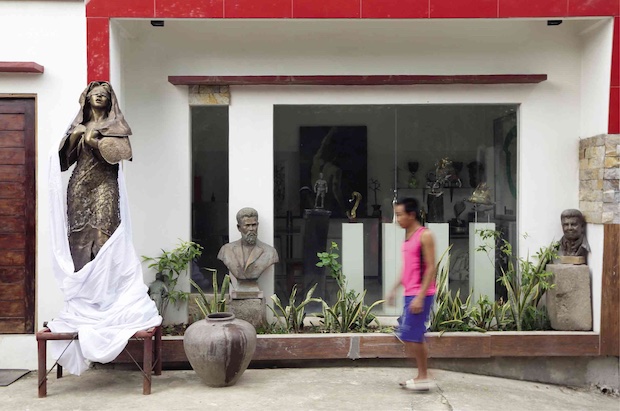PH failed to aid World War II ‘comfort women’ – UN body

This bronze statue (left), which was dedicated to the comfort women of World War II, used to be at Manila Baywalk. But it was removed in 2018 and returned to the studio of the artist Jonas Roces in Antipolo. (File photo by NIÑO JESUS ORBETA / Philippine Daily Inquirer)
MANILA, Philippines — The Philippine government violated the rights of World War II “comfort women” by failing to give them reparations, social support, and recognition despite their long-time clamor, according to the United Nations Committee on the Elimination of Discrimination against Women (CEDAW).
In a landmark decision, the committee said in a statement posted on its website:
“The UN women’s rights committee has found that the Philippines violated the rights of victims of sexual slavery perpetrated by the Imperial Japanese Army during the Second World War by failing to provide reparation, social support, and recognition commensurate with the harm suffered.”
According to the committee, the government failed to fulfill its obligations despite the “extreme severity of the acts of gender-based violence to which [they] were subjected and their right not to be continuously discriminated against and to obtain restitution, compensation, and rehabilitation.”

The committee made the decision in response to a case brought before it in 2019 by a group of Filipino comfort women, who first went public — in their twilight years — about their ordeal in the mid-1990s.
“Given the absence of any possibility of enforcing their rights as fully as possible, the Committee concludes that the State party has breached its obligations under articles 1 and 2 (b) and (c) of the Convention,” it added.
The decision was referring to the Convention on the Elimination of All Forms of Discrimination against Women New York that was adopted on Dec. 18, 1979.
In its decision, the committee is asking the Philippine government to “provide the victims full reparation, including recognition and redress, an official apology and material and moral damages.”
The damages to be awarded should be commensurate to the “continuous discrimination that they suffered” because of the government’s failure to demand from the Japanese government their long overdue reparations.
It also called for the establishment of a state-sanctioned fund to provide compensation for the victims, and to create a memorial to preserve the site of the Bahay ng Pula (Red House) the brothel in San Ildefonso, Pampanga, where the women were detained, abused, and tortured by Japanese soldiers in 1944.
It also recommended that the government include in the school curriculum the history of Filipino victims and survivors of wartime sexual slavery — “as remembrance is critical to a sensitive understanding of the history of human rights violations endured by these women, to emphasize the importance of advancing human rights, and to avoid recurrence.”
In a statement, committee member Marion Bethel said the decision could hopefully ºpave the way for restoring their dignity, integrity, reputation and honor.”
“This is a symbolic moment of victory for these victims who were previously silenced, ignored, written off and erased from history in the Philippines,” Bethel added.
The UN decision came four years after the Malaya Lolas — a group of 24 grandmothers who had suffered as comfort women — raised their demand for reparations and recognition before the international body, having failed to obtain them from the Philippine government.
In a communiqué issued by the Center for International Law (Centerlaw) in the Philippines and the European Center for Constitutional and Human Rights, the Filipino grandmothers sued the Philippine government for “continued discrimination” and for ignoring their longtime demands more than 75 years after the country’s liberation from Japanese occupation.
The women had spent their postwar lives enduring both the physical and psychological trauma of their experience, as it continued to affect their marriage, work, and community relations, the communiqué said.